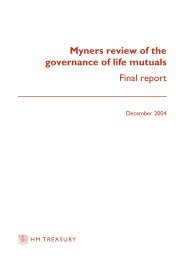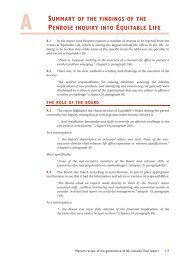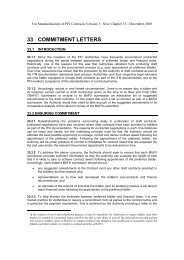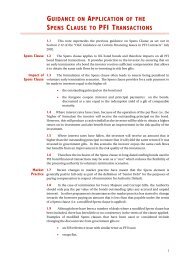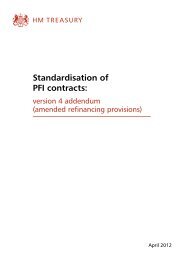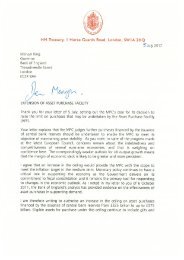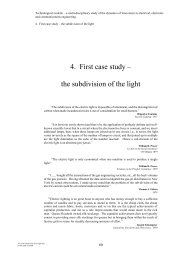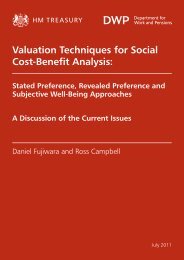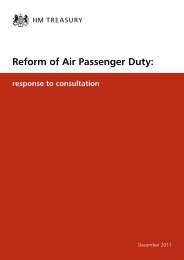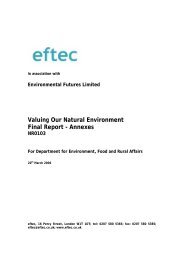NAO Good Practice Guide - Tackling external fraud - HM Treasury
NAO Good Practice Guide - Tackling external fraud - HM Treasury
NAO Good Practice Guide - Tackling external fraud - HM Treasury
Create successful ePaper yourself
Turn your PDF publications into a flip-book with our unique Google optimized e-Paper software.
40 <strong>Good</strong> practice in tackling <strong>external</strong> <strong>fraud</strong> | Detecting and investigating <strong>external</strong> <strong>fraud</strong> and imposing sanctions<br />
3.36 The Serious Crime Act 007 abolished<br />
the Assets Recovery Agency and transferred its<br />
civil recovery and taxation powers to the Serious<br />
Organised Crime Agency which now undertakes<br />
civil recovery and tax investigations in England,<br />
Wales and Northern Ireland. The Act also conferred<br />
on the Revenue and Customs Prosecutions Office,<br />
the Crown Prosecution Service, the Serious Fraud<br />
Office and Public Prosecutor Northern Ireland the<br />
power to bring civil recovery proceedings in the<br />
same way as the Assets Recovery Agency.<br />
3.37 Whilst other agencies are developing their<br />
civil recovery capabilities, the Serious Organised<br />
Crime Agency is providing support by taking on<br />
cases referred to it, where the use of civil recovery<br />
and tax powers would be in the public interest.<br />
Where a law enforcement agency or prosecution<br />
authority has a criminal case which it has been<br />
unable to prosecute successfully it can refer the<br />
case to the Serious Organised Crime Agency. For a<br />
case to be considered for adoption by the Agency<br />
recoverable property must have been identified and<br />
have an estimated value of at least £ 0,000; the<br />
recoverable property must include property other<br />
than cash or negotiable instruments (although cash<br />
is recoverable if it is in addition to other property);<br />
and there must be evidence of criminal conduct<br />
that is supported to the civil standard of proof,<br />
that is, on the balance of probabilities. Figure 37<br />
outlines actions taken by the Department for Work<br />
and Pensions to recover assets and Figure 38<br />
provides an example of Revenue and Customs<br />
Prosecutions Office application of criminal<br />
confiscation powers.<br />
3.38 The Home Office has recently consulted on<br />
proposals to increase dramatically the quantity of<br />
criminal assets recovered. Its proposals are set out<br />
in the Assets Recovery Action Plan of May 007.<br />
Figure 37<br />
Action to recover assets and seek<br />
criminal compensation<br />
The Department for Work and Pensions has<br />
emphasised the punitive, deterrent and disruptive effects<br />
of the recovery of assets deemed to be the proceeds<br />
of crime and are making use of the new powers of<br />
confiscation for offences committed under the Proceeds<br />
of Crime Act 2002. In 2007-08, the Department obtained<br />
136 confiscation orders, 33 compensation orders and<br />
85 voluntary payments as a direct result of the Proceeds<br />
of Crime powers. These totalled £7.55 million with a<br />
further £54,266 paid in costs to the Department for the<br />
confiscation proceedings.<br />
Figure 38<br />
Revenue and Customs Prosecutions<br />
Office use of criminal confiscation powers<br />
to recover the proceeds of crime<br />
In 2006-07 the Revenue and Customs Prosecutions<br />
Office restrained £103.6 million in assets to prevent<br />
them being dissipated and obtained 445 confiscation<br />
orders worth £55.7 million. The Revenue and Customs<br />
Prosecutions Office collected confiscation receipts of<br />
£24.2 million at a cost of £2.2 million.<br />
Revenue and Customs Prosecutions Office prosecuted<br />
the owner of an accountancy practice in Torquay<br />
although he was not a qualified accountant. He took<br />
on the affairs of a wealthy local family who had recently<br />
paid substantial amounts in Capital Gains Tax on the<br />
sale of their business. He submitted a <strong>fraud</strong>ulent claim<br />
for the repayment of the Capital Gains Tax on his<br />
clients’ behalf and forged their signature on a payment<br />
authority. He then stole the refund of £300,000 and<br />
used it to pay for an extravagant lifestyle. He pleaded<br />
guilty to forgery and was sentenced to 30 months’<br />
imprisonment and a confiscation order of £370,000<br />
with five years in default.



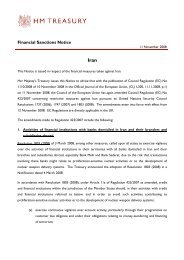
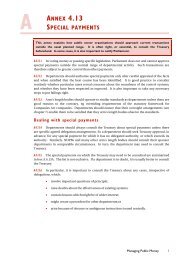
![AIRTO [Professor Dr Brian Blunden] - HM Treasury](https://img.yumpu.com/15492848/1/184x260/airto-professor-dr-brian-blunden-hm-treasury.jpg?quality=85)
